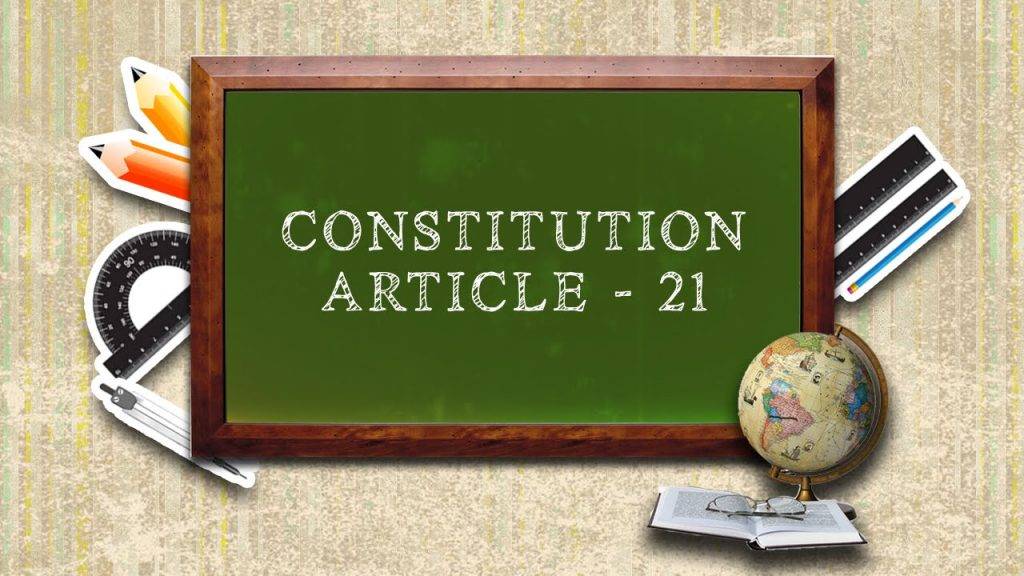Table of Contents
CHANGING DIMENSIONS OF ARTICLE 21
INTRODUCTION
If there is one article in the entire Indian Constitution which has been interpreted expansively in favour of individuals it is article 21. The meaning and purpose of this article from life to death, shelter, food, dignity etc has been interpreted according to the changing times and modifying needs of the society.
Article 21 is mainly inspired by American Constitution, which says no person shall be deprived of life or personal liberty except according to ‘Due Process of Law’ which means that the court has powers to control the actions of legislative and executive. In simple words the court can question over substantive as well as procedural laws.
Dr. BR. Ambedkar suggested to incorporate the phrase ‘Due Process of Law‘ in Indian Constitution as well. But, sir Alladi Krishnas wamy Aiyar said that whenever social justice would be needed, this phrase can cause a sense of restrictions or contradictions to those changes and that’s why we have ‘ Procedure Established by law’ that focuses only upon ‘Procedural Laws’ and ‘Executive actions’.
Procedure established by law was used in article 21 till 1978 which gave protection from ‘Arbitrary Executive Actions’ which means we could only challenge those executive actions which were not Just, Fair or reasonable but did get any protection from ‘Arbitrary Legislative Actions’. This is the sole reason why the Supreme Court gave narrow interpretation of article 21 in Ak Gopalan case. And further this interpretation revamped into wide one in Maneka Gandhi case and the court succeeded in reading the phrase ‘due process of law’under article 21.
WHAT DOES ARTICLE 21 SAY
- No person shall be deprived of his life or personal liberty except according to procedure established by law.
- Article 21 can only be claimed when a person is deprived of his “life” or “personal liberty” by the “state” as defined in article 12.
- Violation of the right by private individuals is not within the preview of article 21.
- Article 21 applies to natural person. The right is available to every person, citizen or alien. Thus even a foreigner can claim this right . It, however, doesn’t entitled a foreigner the right to reside and settle in India, as mentioned in article 19(1)(e).
Let’s discuss some judgements that changed the interpretation of life and Liberty under article 21 time to time
AK GOPALAN V STATE OF MADRAS
In AK Gopalan v State of Madras, the Apex Court interpreted article 21 in a narrow and restricted manner and interpreted the expression ‘personal liberty’ as merely protection for one’s bodily parts i.e the State can not damage or harm to the body of an individual.
Court also refused to read the phrase ‘due process of Law’ under article 21. A “law” affecting life and liberty could not be declared unconstitutional merely because it lacked natural justice or due procedure.
Hence article 21 provided no immunity against competent legislative action and only against the executive actions.
MANEKA GANDHI V. UNION OF INDIA
In Maneka Gandhi v UoI, the Supreme Court overruled it’s earlier decision and gave the widest possible meaning to article 21.
It held that there is no difference between liberty and personal liberty and the expression ‘personal liberty’ includes all the aspects of liberty enjoyed by an individual i.e Article 19 and Article 21 belong to same class of rights.
Further SC held that article 21 includes inherently the principle of natural justice in itself. Thus any law passed by the legislature that seeks to deprive an individual of his life or liberty shall have to be just, fair and reasonable.
‘Life’ in article 21 of the constitution is not merely the physical act of breathing. It does not connote mere animal existence but has a much wider meaning which include:
- Right To Live With Human Dignity
- Right To Livelihood
- Right To Health
- Right To Pollution Free Air
- Right To Legal Aid
- Right To Shelter
- Right To Privacy
- Right To Travel, etc.
TELEPHONE TAPPING CASE (PUCL V. UOI)
In PUCL v UoI, SC held that a telephonic conversation in private without interference would come under the purview of right to privacy as mandated in the constitution.
The court further observed that unlawful means of phone tapping are invasions in privacy and are uncivilized and undemocratic in nature.
Guidelines regarding phone tapping given by SC:
- If a telephone needs to be tapped, then the home secretary of the Union government or the respective State Government can issue an order to this effect.
- Strong reasons have to be specified in order to issue such a directive.
- Such an order shall be in force only for 2 months unless there is another order, which will give the home secretary the right to extend it by another 6 months only.
Further the court held that records relating to phone tapping should be used and destroyed within two months
RIGHT TO DIE
- In P. Rathinam case, SC held that right to die us the fundamental Right and thus section 309 of the IPC which provides punishment for attempt to commit suicide by a person, as unconstitutional.
- In Giankaur v State of Punjab,SC overruled their earlier decision and held that right to life includes right to live with human dignity which means the existence of such a right is upto the end of natural life.
RIGHT TO FOOD STARVATION DEATH
- SC in PUCL v UoI, held that people who are starving because of their inability to purchase foodgrains have right to get food under article 21. Thus state must provide it out of surplus stick lying with them especially to destitute, disabled, pregnant women and lactating mothers.
Author: sushma,
Ideal Institute of Management and Technology, 2nd year (BALLB)

